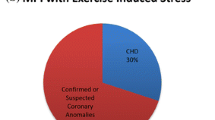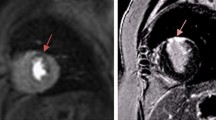Abstract
Stress myocardial perfusion scintigraphy imaging (SMPSI) has important applications for evaluating coronary disease and ventricular function. Studies consistently focus on the left ventricle (LV), with no normal right ventricle (RV) data available. This study sought to evaluate the feasibility of RV perfusion with technetium (Tc-99m) sestamibi using a low radiotracer dose for children free of coronary artery (CA) anomalies and to determine its normal pattern. Patients with a history of Kawasaki disease who showed no coronary complications on selective angiography or no LV perfusion defects on SMPSI were studied at rest and during an exercise challenge. The RV uptake counts were compared with those for different segments of the LV, and multiple ratios of the uptakes between RV and LV segments were calculated. The study subjects were 23 children (age, 11.1 ± 3.3 years) imaged with 0.12 ± 0.03 mCi/kg at rest and 0.31 ± 0.06 mCi/kg during stress. The RV to LV uptake proportion was approximately 6%. Exercise-related uptake increased threefold in both the RV and the LV. The findings showed RV myocardial scintigraphy to be feasible with reproducible ratios. Potential clinical applications include acquired and congenital CA anomalies such as Kawasaki disease, right CA ostium stenosis after a switch operation, and anomalous origin of the right CA.

Similar content being viewed by others
References
Akiba T, Yoshikawa M, Otaki S, Nakasato M, Suzuki H, Sato S, Sato T (1992) Estimation of right ventricular pressure in children by thallium-201 myocardial imaging using single-photon emission computed tomography. Am J Cardiol 69:673–676
Alam M, Samad BA (1999) Detection of exercise-induced reversible right ventricular wall motion abnormalities using echocardiographic determined tricuspid annular motion. Am J Cardiol 83:103–105, A8
Armstrong DW, Matangi MF (2010) Estimated right ventricular systolic pressure during exercise stress echocardiography in patients with suspected coronary artery disease. Can J Cardiol 26:e45–e49
Ayalp R, Mavi A, Serçelik A, Batyraliev T, Gümüsburun E (2002) Frequency of the anomalous origin of the right coronary artery with angiography in a Turkish population. Int J Cardiol 82:253–257
Bangalore S, Yao SS, Chaudhry FA (2007) Role of right ventricular wall motion abnormalities in risk stratification and prognosis of patients referred for stress echocardiography. J Am Coll Cardiol 50:1981–1989
Basso C, Maron BJ, Corrado D, Thiene G (2000) Clinical profile of congenital coronary artery anomalies with origin from the wrong aortic sinus leading to sudden death in young competitive athletes. J Am Coll Cardiol 35:1493–1501
Bonnet D, Bonhoeffer P, Piéchaud JF, Aggoun Y, Sidi D, Planché C, Kachaner J (1996) Long-term fate of the coronary arteries after the arterial switch operation in newborns with transposition of the great arteries. Heart 76:274–279
Chen ML, Lo HS, Chao IM, Su HY (2007) Dipyridamole Tl-201 myocardial single photon emission computed tomography in the functional assessment of anomalous left coronary artery from the pulmonary artery. Clin Nucl Med 32:940–943
Cumming GR, Everatt D, Hastman L (1978) Bruce treadmill test in children: normal values in a clinic population. Am J Cardiol 41:69–75
Curtis N, Levin M (1998) Kawasaki disease thirty years on. Curr Opin Pediatr 10:24–33
Dahdah NS, Fournier A, Jaeggi E, van Doesburg NH, Lambert R, Dionne N, Sauvé C (1999) Segmental myocardial contractility versus perfusion in Kawasaki disease with coronary arterial aneurysm. Am J Cardiol 83:48–51
Dajani AS, Taubert KA, Gerber MA, Shulman ST, Ferrieri P, Freed M, Takahashi M, Bierman FZ, Karchmer AW, Wilson W (1993) Diagnosis and therapy of Kawasaki disease in children. Circulation 87:1776–1780
Davis JA, Cecchin F, Jones TK, Portman MA (2001) Major coronary artery anomalies in a pediatric population: incidence and clinical importance. J Am Coll Cardiol 37:593–597
Dilsizian V, Bonow RO, Epstein SE, Fananapazir L (1993) Myocardial ischemia detected by thallium scintigraphy is frequently related to cardiac arrest and syncope in young patients with hypertrophic cardiomyopathy. J Am Coll Cardiol 22:796–804
Elhendy A, Zoet-Nugteren S, Cornel JH, Fioretti PM, Bogers AJ, Roelandt JR, Krenning E, Postma-Tjoa J, McGhie J, Spitaels SE (1996) Functional assessment of ALCAPA syndrome by dobutamine stress thallium-201 SPECT and echocardiography. J Nucl Med 37:748–751
El-Segaier M, Lundin A, Hochbergs P, Jögi P, Pesonen E (2010) Late coronary complications after arterial switch operation and their treatment. Catheter Cardiovasc Interv 76:1027–1032
Espinola-Zavaleta N, Alexanderson E, Attié F, Castellanos LM, Dueñas R, Rosas M, Keirns C (2004) Right ventricular function and ventricular perfusion defects in adults with congenitally corrected transposition: correlation of echocardiography and nuclear medicine. Cardiol Young 14:174–181
Frescura C, Basso C, Thiene G, Corrado D, Pennelli T, Angelini A, Daliento L (1998) Anomalous origin of coronary arteries and risk of sudden death: a study based on an autopsy population of congenital heart disease. Hum Pathol 29:689–695
Fukuda T, Ishibashi M, Yokoyama T, Otaki M, Shinohara T, Nakamura Y, Miyake T, Kudoh T, Oku H (2002) Myocardial ischemia in Kawasaki disease: evaluation with dipyridamole stress technetium 99m tetrofosmin scintigraphy. J Nucl Cardiol 9:632–637
Haley JH, Miller TD (2001) Myocardial ischemia on thallium scintigraphy in hypertrophic cardiomyopathy: predictor of sudden cardiac death. Circulation 104:E71–E71
Hamamichi Y, Ichida F, Tsubata S, Hirono K, Watanabe S, Rui C, Yu X, Uese K, Hashimoto I, Simizu M, Seto H, Origasa H, Miyawaki T (2002) Dobutamine stress radionuclide ventriculography reveals silent myocardial dysfunction in Kawasaki disease. Circ J 66:63–69
Hayes AM, Baker EJ, Kakadeker A, Parsons JM, Martin RP, Radley-Smith R, Qureshi SA, Yacoub M, Maisey MN, Tynan M (1994) Influence of anatomic correction for transposition of the great arteries on myocardial perfusion: radionuclide imaging with technetium-99m 2-methoxy isobutyl isonitrile. J Am Coll Cardiol 24:769–777
Kashyap R, Mittal BR, Bhattacharya A, Manojkumar R, Singh S (2011) Exercise myocardial perfusion imaging to evaluate inducible ischaemia in children with Kawasaki disease. Nucl Med Commun 32:137–141
Kato H, Sugimura T, Akagi T, Sato N, Hashino K, Maeno Y, Kazue T, Eto G, Yamakawa R (1996) Long-term consequences of Kawasaki disease: a 10- to 21-year follow-up study of 594 patients. Circulation 94:1379–1385
Legendre A, Losay J, Touchot-Koné A, Serraf A, Belli E, Piot JD, Lambert V, Capderou A, Planche C (2003) Coronary events after arterial switch operation for transposition of the great arteries. Circulation 108(Suppl 1):186–190
Liberthson RR, Dinsmore RE, Fallon JT (1979) Aberrant coronary artery origin from the aorta: report of 18 patients, review of literature and delineation of natural history and management. Circulation 59:748–754
Lim CW, Ho KT, Quek SC (2006) Exercise myocardial perfusion stress testing in children with Kawasaki disease. J Paediatr Child Health 42:419–422
Millane T, Bernard EJ, Jaeggi E, Howman-Giles RB, Uren RF, Cartmill TB, Hawker RE, Celermajer DS (2000) Role of ischemia and infarction in late right ventricular dysfunction after atrial repair of transposition of the great arteries. J Am Coll Cardiol 35:1661–1668
Miyagawa M, Mochizuki T, Murase K, Tanada S, Ikezoe J, Sekiya M, Hamamoto K, Matsumoto S, Niino M (1998) Prognostic value of dipyridamole-thallium myocardial scintigraphy in patients with Kawasaki disease. Circulation 98:990–996
Muta H, Ishii M (2010) Percutaneous coronary intervention versus coronary artery bypass grafting for stenotic lesions after Kawasaki disease. J Pediatr 157:120–126
Nadel HR, Stilwell ME (1998) Cardiopulmonary nuclear medicine in children. In: Freeman LM (ed) Nuclear Medicine Annual 1998. Lippincott-Raven Publishers, Philadelphia, pp 165–224
Newburger JW, Takahashi M, Gerber MA, Gewitz MH, Tani LY, Burns JC, Shulman ST, Bolger AF, Ferrieri P, Baltimore RS, Wilson WR, Baddour LM, Levison ME, Pallasch TJ, Falace DA, Taubert KA, Committee on Rheumatic Fever, Endocarditis, and Kawasaki Disease, Council on Cardiovascular Disease in the Young, American Heart Association (2004) Diagnosis, treatment, and long-term management of Kawasaki disease: a statement for health professionals from the Committee on Rheumatic Fever, Endocarditis, and Kawasaki Disease, Council on Cardiovascular Disease in the Young, American Heart Association. Pediatrics 114:1708–1733
Picano E (2009) Stress echocardiography, 5th edn. Springer, Berlin, pp 105–123
Rabinovitch M, Fischer KC, Treves S (1981) Quantitative thallium-201 myocardial imaging in assessing right ventricular pressure in patients with congenital heart defects. Br Heart J 45:198–205
Rudski LG, Lai WW, Afilalo J, Hua L, Handschumacher MD, Chandrasekaran K, Solomon SD, Louie EK, Schiller NB (2010) Guidelines for the echocardiographic assessment of the right heart in adults: a report from the American Society of Echocardiography endorsed by the European Association of Echocardiography, a registered branch of the European Society of Cardiology, and the Canadian Society of Echocardiography. J Am Soc Echocardiogr 23:685–713
Scopinaro F, Manni C, Miccheli A, Massa R, De Vincentis G, Schillaci O, Ierardi M, Danieli R, Banci M, Iorio F (1996) Muscular uptake of Tc-99m MIBI and TI-201 in Duchenne muscular dystrophy. Clin Nucl Med 21:792–796
Senzaki H (2008) Long-term outcome of Kawasaki disease. Circulation 118:2763–2772
Sicari R, Nihoyannopoulos P, Evangelista A, Kasprzak J, Lancellotti P, Poldermans D, Voigt JU, Zamorano JL, European Association of Echocardiography (2009) Stress Echocardiography Expert Consensus Statement–Executive Summary: European Association of Echocardiography (EAE) (a registered branch of the ESC). Eur Heart J 30:278–289
Stern H, Sauer U, Locher D, Bauer R, Meisner H, Sebening F, Bühlmeyer K (1993) Left ventricular function assessed with echocardiography and myocardial perfusion assessed with scintigraphy under dipyridamole stress in pediatric patients after repair for anomalous origin of the left coronary artery from the pulmonary artery. J Thorac Cardiovasc Surg 106:723–732
Suzuki A, Kamiya T, Kuwahara N, Ono Y, Kohata T, Takahashi O, Kimura K, Takamiya M (1986) Coronary arterial lesions of Kawasaki disease: cardiac catheterization findings of 1,100 cases. Pediatr Cardiol 7:3–9
Tanel RE, Wernovsky G, Landzberg MJ, Perry SB, Burke RP (1995) Coronary artery abnormalities detected at cardiac catheterization following the arterial switch operation for transposition of the great arteries. Am J Cardiol 76:153–157
Taylor AJ, Rogan KM, Virmani R (1992) Sudden cardiac death associated with isolated congenital coronary artery anomalies. J Am Coll Cardiol 20:640–647
Vogel M, Smallhorn JF, Gilday D, Benson LN, Ash J, Williams WG, Freedom RM (1991) Assessment of myocardial perfusion in patients after the arterial switch operation. J Nucl Med 32:237–241
Weindling SN, Wernovsky G, Colan SD, Parker JA, Boutin C, Mone SM, Costello J, Castañeda AR, Treves ST (1994) Myocardial perfusion, function, and exercise tolerance after the arterial switch operation. J Am Coll Cardiol 23:424–433
Wilkins CE, Betancourt B, Mathur VS, Massumi A, De Castro CM, Garcia E, Hall RJ (1988) Coronary artery anomalies: a review of more than 10,000 patients from the Clayton Cardiovascular Laboratories. Tex Heart Inst J 15:166–173
Yamanaka O, Hobbs RE (1990) Coronary artery anomalies in 126, 595 patients undergoing coronary arteriography. Cathet Cardiovasc Diagn 21:28–40
Yang HS, Mookadam F, Warsame TA, Khandheria BK, Tajik JA, Chandrasekaran K (2010) Evaluation of right ventricular global and regional function during stress echocardiography using novel velocity vector imaging. Eur J Echocardiogr 11:157–164
Acknowledgments
This study was a site-specific subanalysis from a large multinational industry-sponsored study. Dr. Velasco-Sanchez is supported by two unrestricted grants provided by the LaCaixa Foundation, Spain, and the Sainte-Justine Hospital Foundation, Montreal, Canada.
Author information
Authors and Affiliations
Corresponding author
Rights and permissions
About this article
Cite this article
Velasco-Sanchez, D., Lambert, R., Turpin, S. et al. Right Ventricle Myocardial Perfusion Scintigraphy: Feasibility and Expected Values in Children. Pediatr Cardiol 33, 295–301 (2012). https://doi.org/10.1007/s00246-011-0128-0
Received:
Accepted:
Published:
Issue Date:
DOI: https://doi.org/10.1007/s00246-011-0128-0




